How to Tell If Crystal is Real? Know the Facts!
Fake crystals have been around for as long as real ones. Humans have always been fascinated by the allure of gemstones and crystals, and some have gone to great lengths to create convincing imitations. How can you tell if a crystal is real or fake?
Well, you can use several telltale signs and tests to determine the authenticity of your precious stones.
First and foremost, you should know that fake crystals can be made from materials like Quartz, glass, resin, fillers, acrylic, cubic zirconia, and simulants. These imposters try to mimic the real deal, but today I will be telling you how to tell if the crystal is real.
How to Tell If Crystal Is Real
| Test / Sign | Real Crystals | Fake Crystals |
| Color Zoning | Even color distribution | Fake color banding |
| Clarity or Transparency | Transparent or translucent | May appear cloudy or hazy |
| Patterns | Abstract and inconsistent | Consistent and uniform |
| Interaction With Light | Reflect, diffract, scatter | Appear flat or dull |
| Temperature and Thermal Conductivity | Feel cold and warm up quickly | Lukewarm and slow to warm up |
| Flame Test | Won’t melt or warp | May melt or warp |
| Inclusions | Intricate and unique | Air bubbles or consistent patterns |
| Cost | Generally more expensive | Significantly cheaper |
| Edges | Irregular and natural | Polished or unnaturally uniform |
| Weight | Denser and heavier | May match weight but not always |
| Scratch Test for Hardness | Resists scratches | May scratch more easily |
| Fluorescence | Glows under UV light | Typically doesn’t fluoresce |
| Strange Origins or Names | Commonly found locations | Uncommon origins or new names |
| Compare With Certified Real Ones | Optical phenomena under light | May not exhibit various optical effects |
| Request a GIA Certificate and Report | Expert certification | Lack of certification |
Why is it important to tell the difference apart?
Experts say that fake crystals do not have a lot of harmful effects on your life. But then, why let go of the positivity you may have, right?
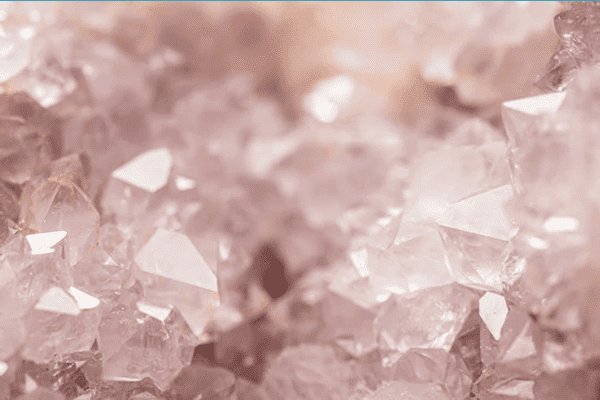
Therefore, you should be mindful of the fact that you have all the right to grab the excellent things in your life that you deserve. So, this leads us to a detailed discussion on the various ways to tell the difference apart between fake and real crystals.
How to Check If Crystal Is Real
To determine if a crystal is genuine, there are several methods you can use.
Color Zoning
One of the first things to check is color zoning. Real crystals exhibit an even distribution of color or may even display shades of different colors from various minerals. For example, genuine Amethyst can showcase vivid lilac, purple, lavender, and more. However, Clear Quartz and Optical Calcite have minimal zoning or color variations. Fake crystals often have fake color banding, so inspect this closely.
Clarity or Transparency
Real crystals are either transparent or translucent, allowing light to pass through. You might even spot inclusions, color zoning, or other crystals within them with the naked eye. On the other hand, fake crystals use dyes to mimic inclusions, but a closer look will reveal the truth. For instance, Diamonds, Rubies, and Sapphires are often faked for clarity with Synthetic Corundum, Moissanites, and CZ stones.
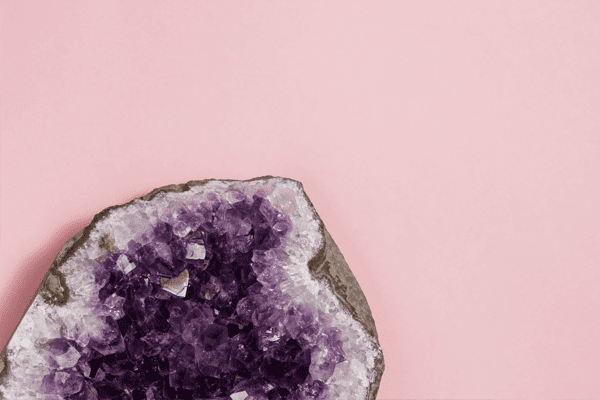
Patterns
Some genuine crystals like Blue Lace Agate, Crazy Lace Agate, Ametrine, and Calligraphy Jasper boast captivating abstract patterns. Fake crystals, however, tend to have a uniform and consistent patterning with colors that mimic the real thing. You can test the crystal by gently applying water (if it’s safe to do so) and then using a damp tissue or cloth to check if the colors transfer.
Interaction With Light
Authentic crystals engage with light in captivating manners, including reflecting, diffracting, dispersing, or scattering light based on their unique refractive index. Some even exhibit mesmerizing optical effects such as Asterism (Star), Chatoyancy (Cat Eye), Pleochroism (Color Change), and beyond.
On the other hand, fake crystals appear flat and dull when moved in front of light. So, hold your crystal under a light bulb and check for refraction, reflection, and other interactions to spot the real deal.
Temperature and Thermal Conductivity of the Crystals
Real crystals feel cold to the touch and warm up quickly due to their excellent heat conductivity. Fakes, however, may feel lukewarm and take longer to warm up. You can even perform a simple ice test to check how fast the crystal warms.
Just be cautious not to try this with low MOHS hardness crystals.
Flame Test
The flame test is another handy method. Hold your crystal in front of a candle flame using a heat-resistant tong. If it’s real, it won’t melt or warp. However, avoid using certain crystals like Amethyst, Fluorite, and Celestite for this test, as they can crack or break from the heat.
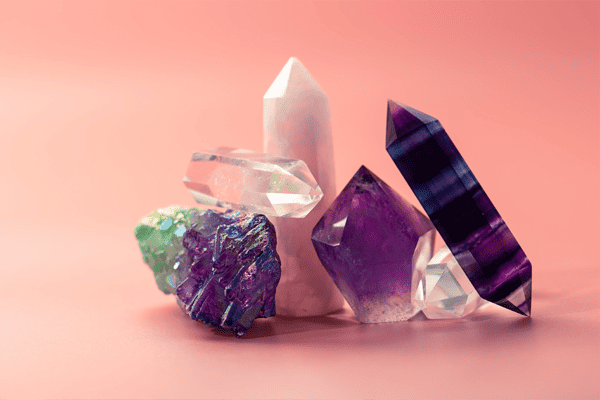
Inclusions
When inspecting a counterfeit crystal through a magnifying loupe, you may detect the presence of trapped air bubbles, typically originating from materials such as plastic, resin, or glass within the stone. On the other hand, real crystals often have intricate and unique inclusions. Keep in mind that crystals can have various inclusions, so use this test in conjunction with others.
Cost
On occasion, the price alone can serve as a clear indicator. Authentic crystals typically command higher prices compared to their synthetic or imitation counterparts due to their relative rarity in nature. It might be too good to be true if you’re getting a crystal at a significantly lower price than others of the same quality and characteristics.
Edges
Unpolished real crystals often have irregular edges, including ridges, indentations, or impurities based on their geological makeup. Fake crystals, however, may appear polished or have unnaturally uniform edges due to dyeing or irradiation.
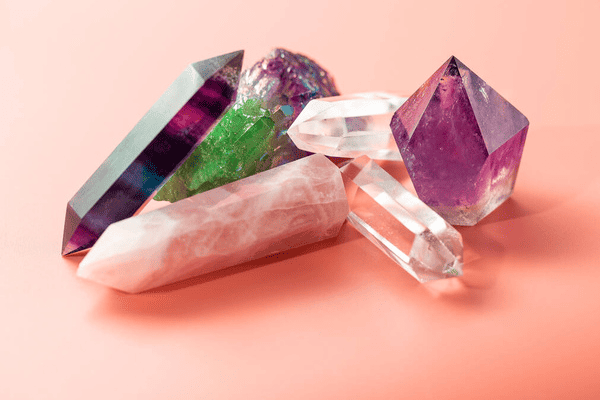
Weight
Genuine gemstones possess a greater density and weight compared to counterfeit crystals crafted from materials like glass, acrylic, pebbles, resin, and plastic. Nevertheless, it’s worth noting that certain manufacturers employ synthetic Quartz simulants to replicate the weight, rendering this criterion less reliable for authentication.
Scratch Test for Hardness
The hardness of a crystal is a reliable indicator. You can perform a scratch test by trying to scratch various objects or even other crystals on the crystal in question. Be cautious, though, as this test can cause lasting damage if done incorrectly.
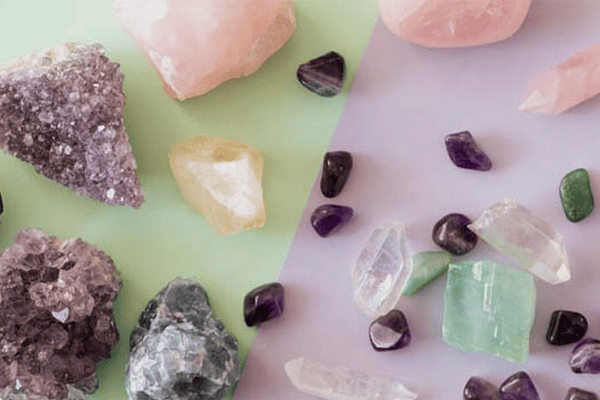
Fluorescence
Real crystals often fluoresce under UV light, emitting colors like purple, red, violet, blue, orange, or green. Fake crystals typically won’t exhibit this phenomenon.
Strange Origins or Names
Be wary of crystals with unusual names or origins. Some genuine crystals are only found in specific locations, so if a seller is advertising a new name or an uncommon origin, research before purchasing.
Compare With Certified Real Ones
One surefire way to confirm the authenticity of a crystal is by comparing it side-by-side with an authentic one. Real crystals will exhibit various optical phenomena under different lights and angles.
Request a GIA Certificate and Report
If unsure, request a certificate from the Gemological Institute of America (GIA) or consult a GIA Gemologist for a report. They can provide expert guidance on your crystal’s authenticity.
Conclusion
Now, it’s essential to consider that these tests and signs aren’t foolproof on their own, and you should ideally use multiple methods to confirm a crystal’s authenticity. If you’re still uncertain about to tell if the crystal is real, it’s a good idea to consult a certified gemologist for further clarification.
In a market flooded with fake crystals, it’s better to be cautious. Don’t be fooled by imposters, and always ensure you’re investing in genuine healing crystals. However, even if a crystal is fake, it can still hold value as a decorative or metaphysical item.
